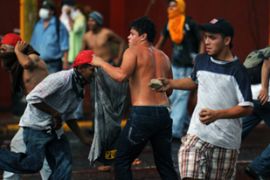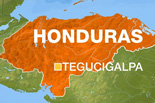Honduras coup triggers clashes
Security forces and supporters of deposed president face off outside presidential palace.

“The police have fired tear gas against the protesters.”
Roadblocks were set up soon after the military forced back the demonstrators, our correspondent said.
Protesters hurt
Cristian Vallejo, a Red Cross paramedic, said he had taken 10 protesters to hospital, most of them with injuries from rubber-coated bullets.
| In video |
|
|
At least 38 demonstrators have been detained by the security forces, said Sandra Ponce, a human rights prosecutor.
Zelaya was forced from power by the military on Sunday, on the same day that he tried to push ahead with a referendum on changes to the constitution.
The military, legislature and courts had already declared Zelaya’s move to hold the non-binding public vote illegal.
They each said that Zelaya was looking to extend his rule by changing the national charter to allow himself to run for a third term in office.
Zelaya, whose four-year term was set to expire in January, had dismissed the claims, saying that constitutional changes were necessary to improve the lives of Honduras’ poor.
Regional condemnation
The removal of Zelaya from the presidency has been denounced by countries allied to the sacked left-wing leader.
 |
| Zelaya has received strong support from regional leaders [AFP] |
Members of the Bolivarian Alternative for the Americas (Alba), which includes Venezuela and Bolivia, said on Monday they would withdraw their ambassadors from Honduras.
Daniel Ortega, Nicaragua’s president, said at the meeting in Manague that El Salvador, Nicaragua and Guatemala would cut trade with Honduras for at least 48 hours.
Hugo Chavez, the Venezuelan president, told Alba members: “We’re ready to support the rebellion of the Honduran people.”
Barack Obama, the US president, on Monday criticised the Honduran military’s removal of Zelaya.
“We believe that the coup was not legal and that President Zelaya remains the democratically elected president there,” Obama said.
“It would be a terrible precedent if we start moving backwards into the era in which we are seeing military coups as a means of political transition rather than democratic elections.
“The region has made enormous progress over the last 20 years in establishing democratic traditions… We don’t want to go back to a dark past.”
Interim president defiant
| Country facts |
|
|
Zelaya was taken by soldiers from his home in his pyjamas on Sunday and sent to Costa Rica.
Roberto Micheletti, the former parliamentary speaker from the same Liberal party as Zelaya, was sworn in by congress as Zelaya’s replacement just hours after the coup.
He said Zelaya was not ousted through a coup but through “a completely legal process as set out in our laws”.
“What we have done here is an act of democracy, because our army has complied with the order of the court, prosecutors and judges,” Micheletti said.
But Zelaya said he had been a “victim of kidnapping” when Honduran soldiers raided his home earlier in the day.
“They came to my house in the early hours of the morning and firing guns, they broke the doors with bayonets and threatened to shoot me,” Zelaya told Venezuela’s Telesur television station.
Calling for “peaceful resistance”, he said he did not “think that the whole army supported this interruption of the democratic system by capturing a president elected by the people”.


